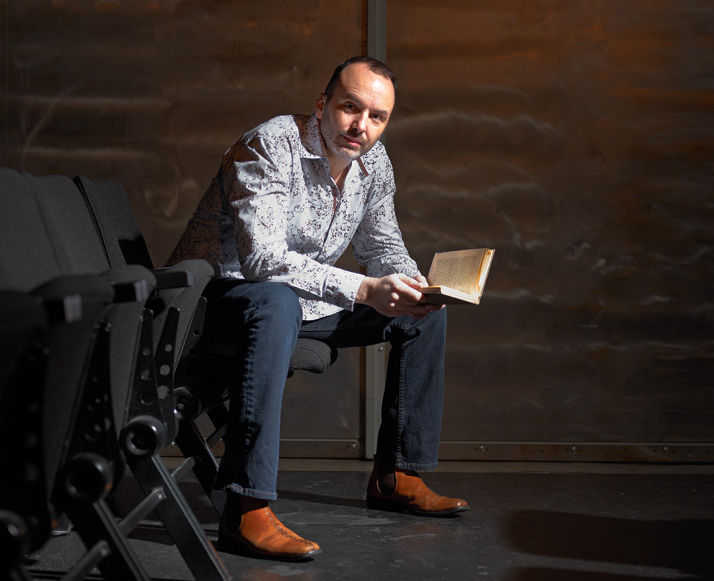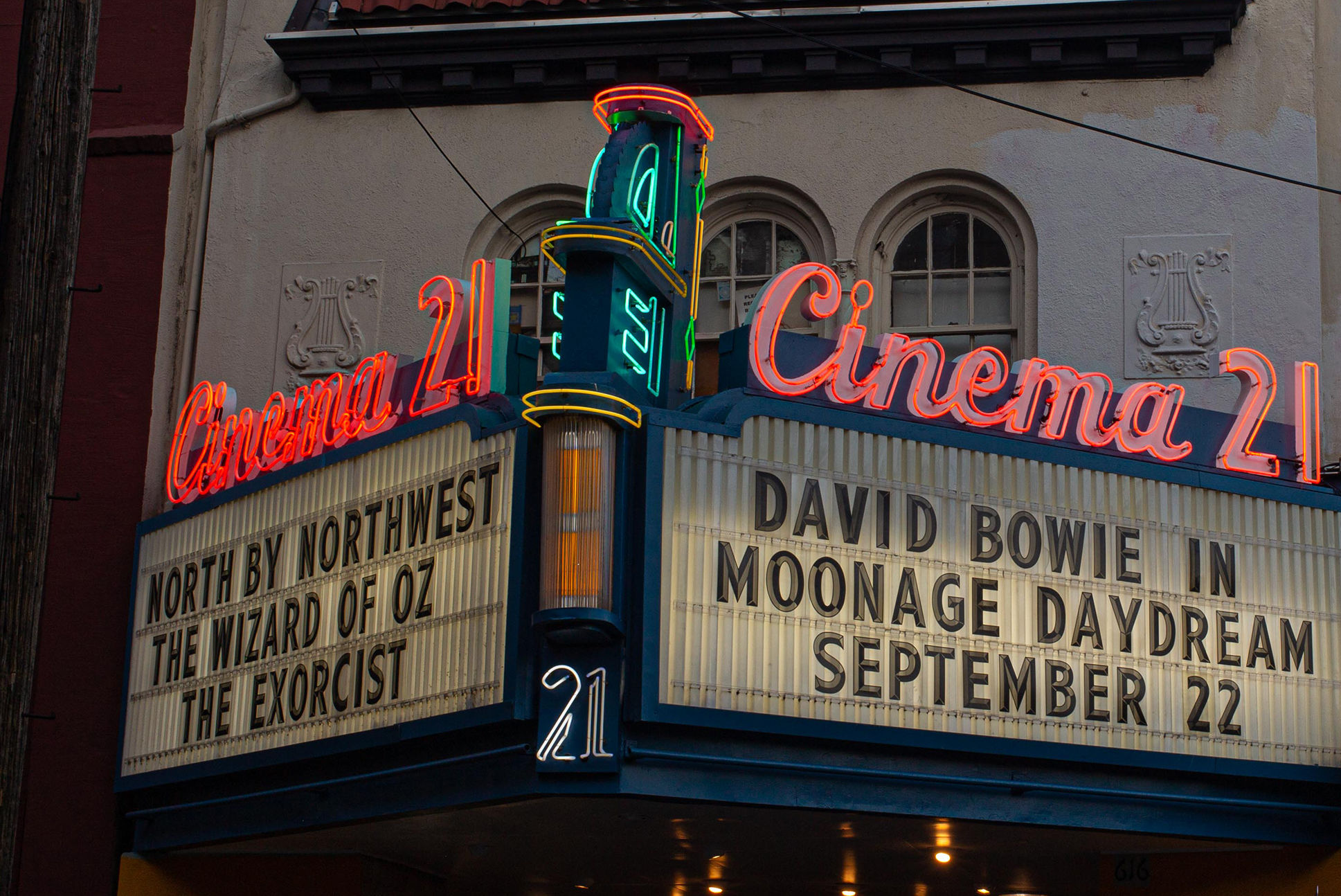Avant Bard

Image: Stuart Mullenberg
AT THE beginning of Shakespeare’s lesser-performed romance Cymbeline, a lower-class lover, Posthumus, is banished for marrying the king’s daughter without permission. The exile sets off a particularly complex Shakespearean web of plot points: political intrigue, mistaken identity, poison, accusations of adultery, murder, and, finally, a bloody battle for the freedom of the kingdom.
But at the climax of Cymbeline, there is an unlikely surprise. Posthumus returns from exile to the king’s court not to wreak vengeance for his suffering but to forgive the man who is its cause: Kneel not to me / The power that I have on you is to spare you / The malice towards you to forgive you: live / And deal with others better.
For Chris Coleman, whose original adaptation premieres this month in Portland Center Stage’s intimate, underground Ellyn Bye Studio, this moment of uncharacteristic absolution is not only the key to understanding the play, but to understanding Shakespeare himself.
“He is an old man looking back at the scars of his own life with a deep sense of regret,” explains Coleman, noting that Cymbeline was among the last of Shakespeare’s 38 plays. “At the end he makes peace, and it seems like somebody who’s tired of fighting, tired of the machinations of the court, and who just wants peace in his personal relationships and political world.”
At the center of Coleman’s adaptation is a new character, the Pianist, an elderly narrator whose monologues cast a melancholy, even rueful pall over a play that is often classified as comedy or romance. You ask, ‘why this tale? Why this Princess? This arrogant outcast?’ the Pianist interjects in the middle of the play. A glimmer of betrayal / A hint of mistrust / Something about screwing up / What was most precious in your own story. Set to the unstructured, dynamic jazz-style of composer Randy Tico, these ruminations become stirring and occasionally haunting.
“The Pianist took on his own voice,” says Coleman, PCS’s artistic director since 2000. “You don’t get details of his biography, but you get hints of why he is obsessed with this story, the story of betrayal, misplaced loyalities, and obsession with power. So in a sense the play is the fantasy of this old piano player who carries us through it and helps it land for us emotionally.”
“It’s bittersweet, evocative,” says Tico, who has worked with Coleman on three other recent productions, describing the live score as a melting pot between Gershwin, classical, and jazz. “It could be played very vibrato. It can speed up or slow down. It’s uplifting, but it moves in unexpected ways. It’s more like watching clouds change than knowing where things are going.”
While PCS has performed adaptations of Shakespeare before, Cymbeline heralds a new maturity in the company, which began in 1988 as an offshoot of the Oregon Shakespeare Festival in Ashland. “Before I got here,” Coleman says, “Shakespeare, the classics, were definitely what people expected to see. I moved away from that consciously because we needed to lean forward, we needed to connect with what Portland was becoming.”
Portland theatergoers have evolved along with PCS. For the production, PCS earned a $20,000 grant from the National Endowment for the Arts’ “Shakespeare for a New Generation” program, which aims to introduce middle and high school students to the Bard’s masterpieces in engaging ways.
Though Coleman is a stickler for authentic dialects, he hopes that performing in the cozy Ellyn Bye Studio will deepen the experience beyond mere costume pageantry for Shakespeare novices and adept alike. With seats arranged in a diamond around a central stage, the cast will move around freely, weaving in front of, between, and behind members of the audience. Adding to that intimacy is Coleman’s casting of only six actors to play all 22 roles.
“Someone will definitely say, ‘You can’t call that Shakespeare.’ Someone always does,” says local editor and dramaturge Mead Hunter, a friend of Coleman who has read drafts of the adaptation. But the interpretation of these plays has always been wildly in flux, the “canonical” Shakespeare being merely the result of endless repetition. Relatability and meaning, Hunter says, too often take a back seat to tradition. “This is our heritage,” he adds. “I think we are really quite free to adapt the text as we see fit.”
The authenticity of the play resides instead in the content and the depth of its meaning, rather than its outward form. Coleman finds much to relate to in the Bard’s writing: in 2009, facing a potentially catastrophic budget crisis at the height of the recession, Coleman was forced to lay off the company’s literary department, including Hunter, PCS’s longtime literary director. In 2010, PCS executive director Greg Phillips quit abruptly for an out-of-state job, dropping his administrative duties in Coleman’s lap. And although Coleman has managed to cut the company’s deficit, $4.3 million of PCS’s $40 million renovation of the Armory in 2006 still remains to be paid.
“I’ve had my stomach kicked in a couple times in the last two years, personally and professionally,” Coleman says. “These characters are able to come and say, ‘Well, I’ll let go of that because you did this,’ and there’s something really beautiful about that.”
The essence of that beauty is that it is anything but inevitable. In Shakespeare’s original text, near the end of the play, the Roman god Jupiter intercedes on Posthumus’s behalf, coming to him in a dream and prophesying his and the kingdom’s future happiness. In Coleman’s telling, however, there are no omnipotent gods to guarantee that final bliss or absolution. There is only the Pianist—human, frail, and penitent—whose reflections always seem to suggest that whatever destiny awaits these characters is the product of conscious choice, not divine intervention.
Of course, Coleman (who first read Cymbeline as a bored college student behind the desk at a Days Inn) is not an old man looking back on his life. But his interpretation does have a Jungian bent: that the Bard’s stories are like dreams, delivering information about ourselves that we may not be conscious of. “Yeah, it’s about a lot of people who get wounded, feel betrayed, and it’s not like it all gets tied up at the end,” he says. “But it has something to teach us about our own journey. We are Posthumus, and we are standing with the person who has betrayed us, and we want to kick them or sue them or cut their tires. Can we find the capacity to forgive?”
Or, in the words of Coleman’s Pianist: Some crumble / Some go mad / Some see the way forward.




